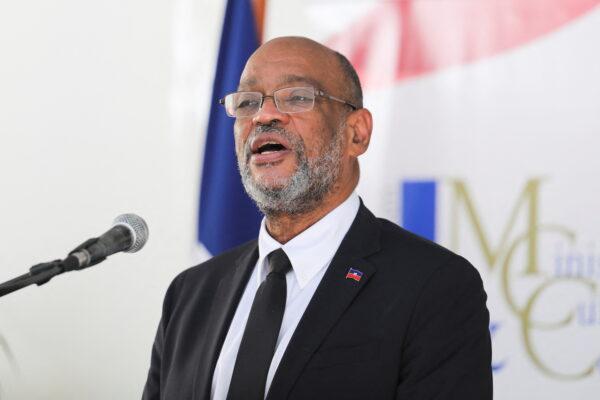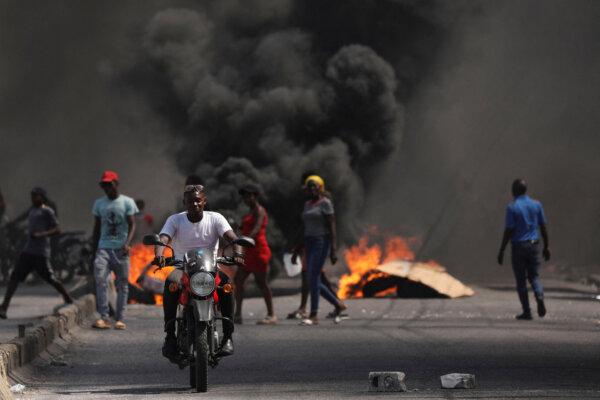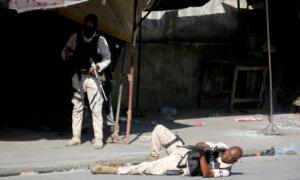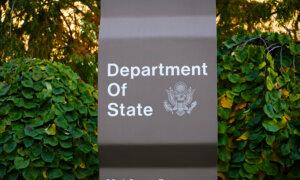Haiti declared a state of emergency on March 3 as gang violence hit the small island state, and calls for the country’s prime minister to resign grew louder.
United States Secretary of State Antony Blinken joined a high-level meeting with Caribbean leaders in Jamaica on Monday to discuss the crisis unfolding in Haiti as gang violence grips the small island state.
Haiti declared a state of emergency on March 3 as fighting escalated.
Instances of home invasions, armed robberies, sexual assaults, and murder have increased beyond police capabilities to respond since 2021. It’s estimated that thousands of people have died since the start of the year; many more are homeless and fleeing, while food and other essential supplies are almost nonexistent.
“It is critical we work together to support the Haitian people, curb escalating violence and unrest, and expedite a political transition,” he said.
Jimmy “Barbeque” Cherizier, a leader of an alliance of armed groups, has claimed responsibility for the increase in violence. He has said the goal is to overthrow Haiti’s unelected Prime Minister Ariel Henry, who came into power in 2021 after his predecessor was assassinated.
Mr. Henry is abroad trying to gain support for a U.N.-backed security force to stabilize the country, which has so far failed. He has repeatedly postponed plans to hold parliamentary and presidential elections, which last happened almost a decade ago. At this stage, he promised to hold general elections by mid-2025. Calls for his resignation grow ever louder amid the unrest.

Haitian Stakeholders Can’t Agree on Rehabilitation Approach
Prior to the high-level meeting, Chairman of the Caribbean Community Mohamed Irfaan Ali released a March 6 statement saying that despite working “around the clock,” no form of consensus had been reached between the Haiti government and the respective stakeholders in the opposition, private sector, civil society, and religious organizations.
Chairman Ali said the issues were being exacerbated by violence and the lack of critical institutions like Parliament, he urged all Haitian stakeholders to consider the effects of their inaction.
“We have been urging all Haitian stakeholders in the urgent need for a consensus given that they all agree that the solution must be Haitian led and Haitian owned,” he said.
“We recognize that there must be a political solution to anchor any stabilization of the security and humanitarian efforts. The fact that more people have died in Haiti in the early part of this year than in the Ukraine must give everyone in Haiti and in the international community serious pause,” Mr. Ali added.

According to Mr. Ali, Haiti will need the support of both the Conference of the Heads of Government of the Caribbean Community (CARICOM) and, more importantly, the international community to restore order.
“But to get there, we must have consensus among the key players in Haiti. They are all aware of the price of failure,” he said.
Multinational Security Support Mission in the Works
Following the closed session, the U.N. Security Council urged the armed gangs operating in Haiti to “immediately cease their destabilizing actions” and called for the “perpetrators of these abhorrent acts to be brought to justice.”
According to U.S. Ambassador to the U.N. Linda Thomas-Greenfield, the hope is to swiftly deploy a U.N.-authorized Multinational Security Support (MSS) mission to bolster the Haitian National Police force and assist efforts to restore peace in Haiti soon.
She revealed that the State Department is working with Congress to provide $200 million in support, while Canada has committed $91.2 million. Benin, France, Germany, Jamaica, and Spain, have also pledged financial, personnel, and logistical support.
“Haitians should not be left hopeless by this situation. Leaders need to take responsibility to act now and commit to a Haitian-led political transition, the establishment of a transitional government, and elections soon thereafter,” Ambassador Thomas-Greenfield said.
“The international community must do everything it can to support these aims. The Haitian people have suffered enough.”
Original News Source Link – Epoch Times
Running For Office? Conservative Campaign Consulting – Election Day Strategies!


